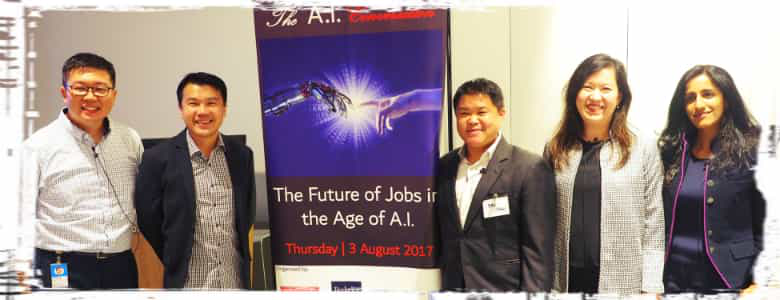Working with AI

Compute these sobering statistics: By 2025, smart robots could replace more than 100 million knowledge workers — a third of the world’s jobs.
By 2055, half of today’s jobs could be automated; closer to home, 56 percent of the Southeast Asian workforce will be at high risk of job loss to automation in the next two decades.
These numbers paint a bleak picture of the future, but Ms Carolyn Chin-Parry, management consultant and board director at KPMG Singapore, isn’t too worried.
“It sounds scary but I’m not losing any sleep over it,” she said. “I think it’s more important to ask what you can do to ensure that we, our children and subsequent generations will be able to keep working.”
Ms Chin-Parry was speaking on 3 August 2017 at a panel discussion entitled ‘The Future of Jobs in the Age of AI’.
The discussion, hosted by the New York University (NYU) Alumni Club in Singapore, was the inaugural event in The AI Conversation, a speaker series focusing on artificial intelligence (AI) and its impact on society.
Ms Chin-Parry was joined by fellow panelists Mr Richard Koh, chief technology officer of Microsoft Singapore; Ms Ayesha Khanna, CEO of ADDO AI; and Mr Charlie Ang, founder of The Innovators Institute and ambassador for Singularity University Singapore.
“There are a lot of jobs that are going to be created, but we are fearful because we don’t know what they will look like. In reality, we should only be worried if we choose to be ignorant or inflexible,” continued Ms Chin-Parry.
Embrace the change
Having an open, flexible attitude is critical because AI and digital labour are here to stay whether we like it or not, said the panel.
Microsoft’s Mr Koh cited the example of former world chess champion Garry Kasparov, who despite his 1997 defeat by IBM’s Deep Blue supercomputer is now an advocate for AI.
“The guy who was humiliated by a machine is now embracing the whole concept of how machines can help humans advance our functions,” said Mr Koh.
Indeed, when properly designed and democratised, AI has incredible potential to be used for public good, and can help address major challenges such as climate change, poverty and disease outbreaks, said Mr Koh.
“AI is not about reducing the dignity of human race; instead it’s about amplifying it.”
When it comes to designing AI-based technologies, transparency (understanding how the technology works) accountability (ensuring that a human is accountable for every decision made by the AI) and privacy should be key considerations, he added.
The promise of good problems
Despite the technology’s promise, a company does not become innovative by virtue of the fact that it uses AI.
Instead, AI needs to be tailored around specific challenges that the company faces, said ADDO AI’s Ms Khanna. “Problem articulation is a big issue — a lot of what we do is sit with C-level executives and walk them through articulating their vision and problem,” she said.
“We then engineer backward to figure out what is needed for that transformation.”
With these problems come many new opportunities for jobs, innovation and collaboration.
Those interested in new use cases for AI should look no further than Asia — the continent is ripe with unique and interesting problems that can be creatively addressed with the technology, added Ms Khanna.
For example, millions of Hindi and Urdu speakers in India and Pakistan send text messages by using the Roman alphabet to spell out the words phonetically.
However, there are as yet no AI libraries that allow computers to parse this ‘Roman Hindi’ or ‘Roman Urdu’, said Ms Khanna.
In a project that has generated a lot of interest from banks and other companies, ADDO AI is now working to build an unsupervised natural language processing model for these languages, she said.
Rethinking our world
In an increasingly digitised, AI-dominated world, our concept of a job should change as well, said Mr Ang from The Innovators Institute.
Employees of the future will need to equip themselves with various skillsets to remain versatile in a rapidly changing market, he said.
“The nature of work is being repackaged, so it’s important to think of different methods to monetise your skillset. I believe that everyone should think like an entrepreneur, like a business of one,” he added.
According to the panel, another area that needs to undergo a paradigm shift is education.
The current university system, where students spend several years acquiring knowledge and then go out to join the workforce, is “not right for the times we live in,” said Ms Chin-Parry, who instead advocated a more fluid system with more opportunities for vocational training, internships, and closer synergies between education providers and employers.
With increased connectivity and access to content, education in the future will not and should not be confined to classrooms, said Mr Koh.
“The classroom format was created for the industrial world,” he said. “It’s a factory that produces workers for another factory.”
In fact, AI will itself play a big role in helping students learn, added Mr Koh.
“I think that’s a good thing because it teaches kids how to work with machines, appreciate them, learn their flaws and prepare for a future where these machines will be around.”
Photo credit:
- Image of Garry Kasparov: Creative Commons Chess grandmaster Garry Kasparov in 2003 by Owen Williams, The Kasparov Agency licensed under CC BY-SA 3.0.

